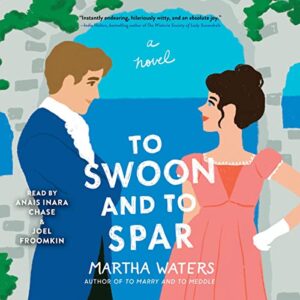Narrated by Anais Inara Chase and Joel Froomkin
To Swoon and to Spar is book four in Martha Water’s Regency Vows series of lively, character-driven historical romances, but it’s the first one I’ve listened to. I read and enjoyed books two and three, so thought I’d give this one a go in audio, and while I did enjoy it, it didn’t have quite the same sparkle as the previous two.
Peter Bourne, Viscount Penvale, (brother of Diana, heroine of book two, To Love and to Loathe) has spent most of his adult life trying to amass sufficient funds to purchase back the family home, Trethwick Abbey in Cornwall. Unusually, the property wasn’t entailed, so when Penvale’s parents died, the place had to be sold in order to pay the massive death duties and his uncle, who had made a fortune in his years with the East India Company, stepped in to buy it. Penvale was only ten years old at the time and could do nothing to prevent the sale to the brother he knew his father despised, and he and Diana (who was five) were packed off to live with their aunt.
Penvale has been making discreet enquiries as to what price his uncle would be prepared to sell the Abbey for ever since he left university, and has received the same reply for over a decade – none that Penvale can afford. Until now, when Bourne tells him he’s willing to sell provided Penvale marries his ward, Jane Spencer. For Penvale, it’s a no-brainer. He’ll have to get married sometime – he needs an heir, after all – so why not at least meet the young woman to discuss it? Diana is less than impressed with the idea and makes no bones about telling Penvale so, but even she can see how much it means to her brother to, at long last, be able to go home.
Jane – the daughter of an old Naval buddy of Mr. Bourne – is not exactly pleased about the idea of being ‘traded’ from one man to another, but she isn’t in a position to refuse to accompany her guardian to London to meet her prospective husband.
Penvale is pleased to find that Miss Jane Spencer is not at all the mousy young woman he had expected. In appearance, she’s striking rather than beautiful, and while she doesn’t seem to have much to say, what she does say is to the point – often to the point of abruptness. He makes it clear to her that he is not going to pressure her into marrying him and that if they do marry, it will be because it’s her choice to do so. Jane, whose imagination had painted a rather daunting picture of a man prepared to marry a woman he has never met, is pleasantly surprised when Penvale turns out to be, well, pleasant – young, handsome and good-natured – and, she reasons, living with him is preferable to continuing to live with her guardian, so she accepts his offer. It’s not until after everything is settled – Jane and Penvale are wed and money has changed hands – that Penvale’s uncle tells him the real reason he was prepared to sell Trethwick Abbey. The place is haunted.
Naturally, Penvale, a practical man not given to flights of fancy, doesn’t believe a word of it, and he and his new bride begin their journey to Cornwall and into married life. But when, a week or so later, the late-night thumps and screams begin, Penvale begins to wonder if maybe his uncle was right. But there are no such things as ghosts, of that he is certain. So what on earth is going on?
No spoilers – it’s revealed early on that the fake-haunting is all part of Jane’s plan to ensure that Penvale high-tails it back to London, leaving her behind to enjoy the quiet life she craves in the house she loves. But she’s reckoned without Penvale’s love for his home and his determination to do right by his tenants and all those who depend on him for their livelihoods.
Not surprisingly for two people in their situation, it takes some time for Penvale and Jane to begin to unbend towards each other, so this is very much a slow-burn romance. The author’s facility with witty dialogue is once again in evidence here, and the forced proximity in which the couple find themselves eventually leads to their becoming friends and beginning to learn that there is more to the other than at first met the eye. Penvale realises that shyness lies behind Jane’s sharp tongue and prickly demeanour, and I liked how he comes to understand her and to do things to help make her comfortable. For her part, Jane realises Penvale is much more responsible than she’d expected him to be, and can’t help coming to like and respect him for his dedication to the estate.
The romantic chemistry here is more ‘solid’ than it is ‘sizzling’ and I liked that Jane and Penvale’s romance has a strong basis in friendship and mutual understanding; it’s the story of two lonely people who long for a home finding each other. But on the downside, there’s not a great deal of story here and the book feels over-long; the haunting plotline goes on for too long and gets repetitive, and while I liked Penvale, I struggled to warm to Jane, especially in the early stages of the story, because she comes across as rude and hostile.
I’ve been going back and forth on how to rate the narration on this one because my view is coloured by the fact that I’m not a fan of female narrators in general or of dual narrations – which I realise may put me in something of a minority these days. I would much rather listen to one excellent narrator who can portray all the characters effectively than a dual narration – especially where one narrator is clearly more skilled than the other – but the trend in contemporary romance to use two narrators is – unfortunately – bleeding over into historicals. Anais Inara Chase is new-to-me and reads quite well – but she’s reading rather than performing, and her character differentiation is so minimal that I was constantly reliant on dialogue tags or textual indicators to work out who was speaking. On the plus side, she reads animatedly and expressively, and she provides a strong characterisation of Jane; her voice is attractive, her pacing is good and her enunciation is clear. But pairing her with someone like Joel Froomkin (Leslie), who is a vocal actor with an extensive repertoire of character voices at his disposal and a proven track-record in romance narration makes for a jarring contrast. Mr Froomkin is excellent as Penvale, his posh accent and the slightly husky note to his voice a good fit for an English aristocrat, and he does a good job with Jane’s dead-pan waspishness, expertly conveying a wide range of emotion and their growing fondness for each other. Most of the secondary characters are also young men and women (heroes and heroines of the previous books), but where Mr. Froomkin manages to make them sound different from each other and from Penvale and Jane, it’s impossible to distinguish between them aurally in Ms. Chase’s chapters.
To Swoon and to Spar is one of the weaker entries in this series, although it’s still a well-written and enjoyable historical romance. I do wonder if I’d have enjoyed it more in print – but I realise that my personal dislikes are not everyone’s so I’m going to sit on the fence and offer a qualified recommendation.
Caz
Buy To Swoon and to Spar by Martha Waters on Amazon





I’m in agreement about dual narrations. It’s rare to have both narrators equally skilled, and even when they are, you have to deal with two voices to get used to for every character. There are some women narrators that I love, perhaps a few more than you, but I mainly listen to mm so I don’t really have a wide knowledge of who’s out there when it comes to female narrators. But I’d always rather listen to one good narrator handle everything.
Even if both narrators are equally good, it can still be annoying when the one who is your favourite only appears every other chapter! I hope we don’t lose the single narrator audiobook in favour of dual and full cast narrations.